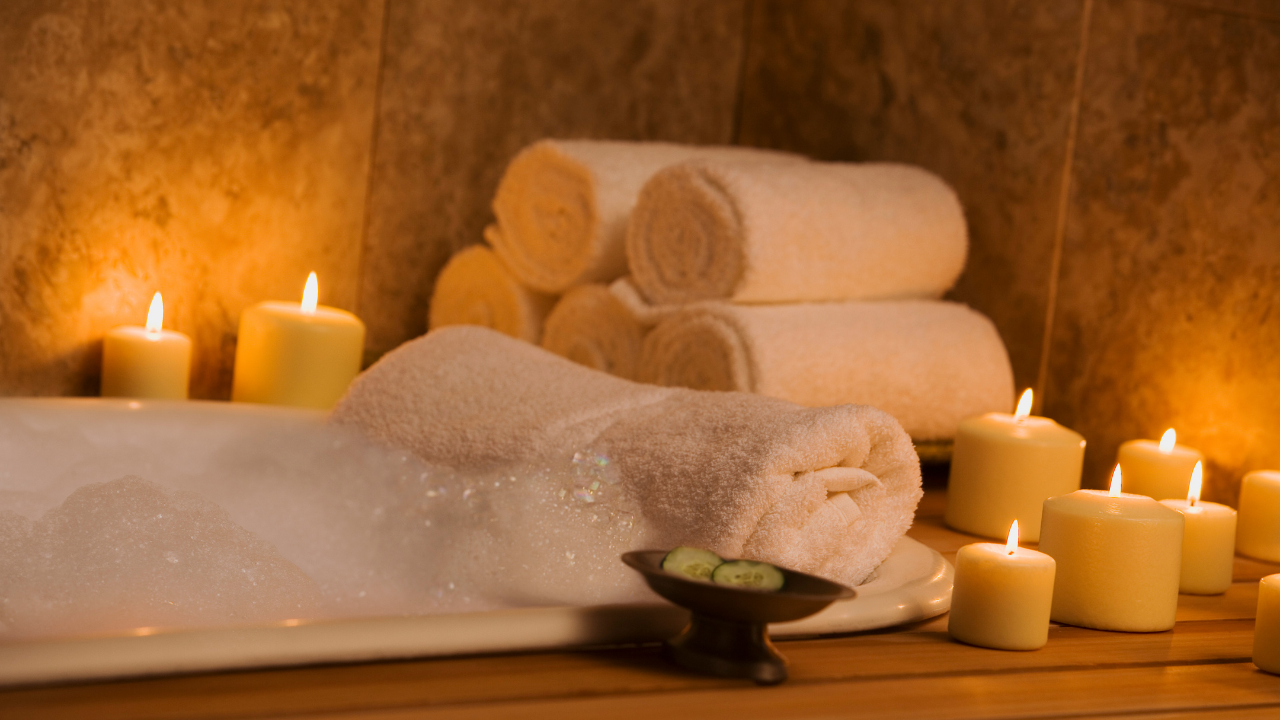17 Stress Busters - That Actually Work!

Try These Stress Busters and watch your stress melt away
17 Powerful Stress Busters
In our everyday life, an event we face or a thought that crosses our mind can make us feel upset, frustrated, nervous, or angry. Stress is a part of life and is a feeling of physical or emotional tension. It's how our body responds to challenges and demands.
In short bursts, stress is normal and can even help us avoid danger or to feel motivated to get things done. However, sometimes it lasts for several weeks or more, long after the stressor is gone. In that case, it may start interfering with our home and work life and lead to serious health problems.
While we cannot always control the circumstances we live in, we can always choose to control how we respond to them. To help release and relieve stress, here are seventeen highly effective stress busters:
1. Breathing
Mindful breathing is an excellent way to help you relax. It is also the best and easiest way to lower stress in your body. Taking a deep breath sends a message to your brain that you need to calm down. The brain then sends a message to your body. Signs of stress such as increased heart rate and high blood pressure tend to decrease when you breathe deeply.
There are different kinds of breathing exercises. One of the simplest is Belly Breathing. This technique is similar to how you breathe, but you are made aware of how you take in and breathe the air out of your body. Here's how:
- Sit in a comfortable position. Put your hand on your belly, just below your rib cage.
- Breathe in through your nose. Feel your belly push your hand outward as it fills in with air.
- Breathe out through pursed lips. Feel your stomach move inward as your breath moves out of your body. Use your hand to press gently on your belly to release the remaining air.
- Do this 3 to 5 times. Remember to take your time with each breath. How do you feel?
2. Meditation
In the dictionary, meditating means thinking deeply or focusing one's mind for a certain amount of time. With the business of today's world, you must be thinking that practising meditation is complex! However, I am one with Deepak Chopra when he said that "meditation is a long-term project." The beauty of undertaking this practice is that in time, "it becomes easy to breathe, to centre yourself and to let your anxieties dissolve away."
If you are new to meditation, here are easy ways on how to start:
- First, find a comfortable and quiet place to sit.
- Set a time limit. Five minutes is suitable for beginners.
- Close your eyes.
- Centre your awareness on the sensations within your body, notice the position of your feet, the weight of your body on your cushion, and your hands on your lap.
- Notice your breath each time you breathe in and out of your body.
- Watch when your mind wanders. Then, return your attention to your breaths.
- When the time is up, open your eyes. Take notice of your environment: the sounds and colours in your surroundings.
- Make it a routine and commit to doing it every day.

That's it! Meditation is more straightforward than most people think.
The practice of noticing when the mind veers away and refocusing on the breaths builds muscles of attention and mindfulness. When you constantly pay attention to your breath and how to return to them and remain in them, you learn to be in the present moment. Being in the present moment anchors us to our centre.
Practising meditation not only lowers your stress levels but also offers far-reaching and long-lasting benefits, including improving focus, sleep, connection, and a whole lot more!
3. Exercise
Exercise, or movement in any form, acts as a stress reliever. It can be tiring and arduous, but it is a surefire way to increase your overall health and a general sense of well-being.
I exercise every day as I LOVE those feel-good hormones that are naturally triggered. Endorphins are our brain's neurotransmitters and are produced after a great workout. Exercise also helps improve the functioning of our body systems like the cardiovascular, respiratory, digestive, and immune systems, which are the same ones we use to fight stress.
When you are feeling under the weather, get up and get moving! Don't be afraid to start. Just remember to take it slowly and walk before you run. Just taking a walk is a great way to exercise.
In the process, the new scenery also keeps your stress in check.

4. Yoga
If you want to do all the above in one activity, you should experience Yoga. Yoga is a mind and body practice. It mixes physical postures, breathing techniques, and meditation. It has numerous physical and mental benefits, including:
- Building muscle strength
- Enhancing flexibility
- Promoting better breathing
- Supporting heart health
- Improving sleep
- And, of course, reducing stress, anxiety, depression, and chronic pain.
5. Music
"Music soothes the soul." Worldwide, music is used in movies, TV shows, videos, radios, podcasts, and even advertisements because of its profound effect on people's emotions. Countless times, music is effective in inducing relaxation and in managing stress.
When you feel stressed, pop in your earphones and play good music. Faster music makes you feel alert. Upbeat music induces feelings of optimism and positivity. Slow music can calm your mind and relax your body.
So, what's your jam?
The important thing is that you like what you are hearing and reduce the tension you are feeling.
Because it is easily accessible, you can use music any time of the day, wherever you are, and whatever you are doing. You can also combine it with other stress busters, such as deep breathing and meditation.
6. Social Connection
Whether you're at work or home and feel that stress looms over, find someone you can talk to, and you will start to feel better. Social support has been studied widely and has been conclusively shown to minimize the effects of stress, and the results are astounding!
It does not always have to be a meaningful conversation. Just talking and being in the presence of a friend or loved one is enough. Knowing that you can reach out to someone makes you feel valued and enhances your resilience from life's stresses.
7. Share a Hug
We usually hug friends and loved ones to show affection, greet them (hello or goodbye) and comfort those who might be in pain. If you have ever been in the receiving end of the hug, you know that it is truly comforting. If you think about it, soft hugs from acquaintances, pets, even virtual hugs during the lockdown felt very good!
But did you know that science backs these feel-good benefits we get from snuggling? If exercise makes your brain produce the feel-good hormone endorphins, a warm hug signals the brain to release the cuddle hormone - oxytocin. Oxytocin reduces inflammation, improve wound healing, lessen cravings, and lower heart rate and stress. So share a hug, and you both reap the benefits!
8. Massage
Suppose you have ever experienced a full-body massage in the past. In that case, you know that it helps release tensed muscles and that it felt invigorating. The American Massage Therapy Association states that Massage Therapy reduces stress significantly on both a physical and psychological level. Studies show that trigger point therapy (a technique used by massage therapists) significantly decreased heart rate, blood pressure, and cortisol levels after only a 10 to 15-minute chair massage. The subjects' emotional states and stress levels also improved.
Next time you go to get a massage, you know that it pampers not only your body but also your emotional well-being.
9. Prepare a Warm Bath
A long and warm bath after a stressful day might be what you need. Ancient cultures have long believed in the healing properties of water. According to studies, our skin releases endorphins, our feel-good hormones, in response to the warm water. It feels energizing and therapeutic because blood flow increases to the skin. In addition, when your body is immersed in water, the pressure increases our lung capacity and oxygen intake, thereby improving our breathing. Improved breathing supports us in stress management.

10. Aromatherapy
Aromatherapy is becoming a popular way to soothe the senses and promote relaxation. Essential oils are now easy to access. 'Young Living' is my fave brand for essential oils. Many people swear by the positive effects it gives in relieving stress and healthy living. Based on a preliminary study, aromatherapy was shown to alter brain waves and behaviours, thereby diverting your thoughts from possible pressing stressors. In addition, it can decrease the stress hormone cortisol, which means it can reduce the perception of stress.
Aromatherapy is widely available and can be used in a variety of ways which include: candles, diffusers, body products, and can be combined with other stress relievers like bath, massage, and meditation.
11. Creativity
Those of you that are artistically inclined will know that creating art is a fantastic stress reliever. It is your catharsis from difficult emotions and distraction from stressful experiences.
Even if art is not your thing, this stress buster is a must-try. Colouring and free drawing minimize anxiety and fight negative moods. Engaging in these simple activities pushes you to be in the moment, making you reap the same benefits of mindfulness and meditation. However, it does not always need to be colouring or drawing. Relax and let your creative juices flow and start making something beautiful! You can be organizing clutter on your desk, rearranging furniture at home, or sorting clothes in the closet!
12. Joy Time
Joy time is taking the time to do more of the things that light up your heart. Some may call it "me time" when they focus on themselves and what they like to do. It can be cooking, gardening, or just sipping coffee leisurely. Whatever it is, if it gives you joy, it will help relieve any stress, so keep at it!
13. Goal setting
Goal setting is a crucial skill in succeeding in all facets of life. It serves as your checklist in achieving your dreams, one after another. What does it have to do with stress management? A well-set list of goals will give your mind a clear direction towards your dreams. When we focus our minds on what we DO want (positive emotion) as opposed to what we DON'T want (negative emotion), there is no room for stress because we experienced positive emotions such as excitement and joy instead of feeling fear or worry.
14. Create the blueprint for the life of your dreams
Take some quiet time to write the story, or blueprint, of how you want your life to look.
What would your ideal dream life look like?
If you could be, do or have anything, what would your deepest heart's desire be?
Dream and brainstorm BIG!
These questions create a roadmap for what you want and serve as a beacon guiding you in your quest. Being familiar with the specifics of the life of your dreams makes the light shine ever brighter.
15. Create a Vision Board
A vision board is a visual representation of your goals. They are typically the size of a poster containing images and texts that represent the things you want to accomplish. You may also add verses that you live by and quotes that motivate you. Place your vision board in a visually accessible part of your house to be reminded of the future you are making for yourself every day. When under stress, creating a vision board will give you a sense of positivity and optimism. Thinking about the goals you want to achieve instantly makes you happier. At the same time, being creative and making something beautiful decreases your stress levels. Learn how to create your very own vision board here>>>
16. Visualize what you want to attract and manifest in your life.
Yes, writing, drawing, and vision boarding are not enough; you must visualize what you want most in life. Remember how powerful your mind is?
What you constantly think about, you attract. So instead of zeroing in on your obstacles and stressors, turn your focus on the dreams and goals you want to tick off your list. Vividly imagine the best-case scenarios in your mind and turn them into movies that keep on playing in your head over and over until it becomes your reality. Being positive like this will melt your negativities and keep you motivated to achieve your dreams in no time.
17. Gratitude Journaling
For everything, be grateful. Make it a habit to list things you are thankful for every day. Bumps in the road counted in, for the challenges you are facing are probably making you stronger and wiser. Be positive and look at them as blessings in disguise. Remember that "stressed," spelt backwards, is "desserts." I have created a beautiful Gratitude Journal, and you can find out more here>>>
Life is sweet. Cherish it and have fun!
Consider Rapid Transformational Therapy
If you feel your restlessness and unhelpful thoughts, emotions and habits are deeply rooted within you, please enjoy a consultation from Mind Motivation Coaching on Rapid Transformational Therapy (RTT).
RTT Therapy incorporates Neurolinguistic Programming, Psychotherapy, Cognitive Behavior Therapy, and Hypnotherapy to deliver fast results. Through hypnosis, RTT can access the mind's subconscious to discover and change or reprogram certain beliefs acquired through the years that stop one's growth and peace of mind.
RTT can be applied in different aspects of one's life like self-confidence, healing from past trauma, quitting addictions, stopping unhealthy behaviours, and counteracting stress, low self-esteem, and lack of confidence.

Are you ready to start your journey towards more freedom, abundance, happiness, and success?
Create your dream life with Mind Motivation Coaching. Work with Myia from anywhere in the world via Zoom and Skype!
"Myia's work is ROCKET FUEL for transforming clients!" - Patty Aubery,
President of The Canfield Training Group
Book a FREE 20-minute phone or Zoom consultation NOW!



